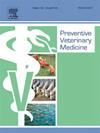A new web application for determining sample size in freedom-from-disease testing with imperfect tests
IF 2.2
2区 农林科学
Q1 VETERINARY SCIENCES
引用次数: 0
Abstract
Veterinary surveillance frequently requires study design for freedom-from-disease testing, specifying a sample size to balance higher statistical power with larger sample sizes against increased research and ethics costs, with the recognition that tests can generate false positive and negative results: i.e., tests exhibit imperfect sensitivity and specificity. In this paper, we revisit the mathematics behind exact calculations of sample size in terms of the binomial and hypergeometric distributions, and present a new algorithm – implemented and available to use in R as a Shiny application with a graphical user interface – to determine sample size for practical situations. Often, sample size calculations are based upon simulations or approximations, but we show here that exact calculations are feasible. In addition, we relax the liberal assumption – which provides conservative sample-size estimates – that sensitivity and specificity are known exactly, and instead assume both are Beta distributed with known hyperparameters. The application presented here was originally designed as a learning tool for students and is now made available for wider use.
一个新的web应用程序,用于在不完善的测试中确定免于疾病测试的样本量。
兽医监测经常要求设计免于疾病检测的研究,规定样本量,以便在样本量较大的较高统计能力与增加的研究和伦理成本之间取得平衡,同时认识到检测可能产生假阳性和阴性结果:即检测表现出不完美的敏感性和特异性。在本文中,我们重新审视了基于二项分布和超几何分布的精确计算样本大小背后的数学,并提出了一种新的算法——在R中实现并可用作带有图形用户界面的Shiny应用程序——来确定实际情况下的样本大小。通常,样本大小的计算是基于模拟或近似,但我们在这里表明,精确的计算是可行的。此外,我们放宽了提供保守样本大小估计的自由假设,即灵敏度和特异性是确切已知的,而是假设两者都是已知超参数的Beta分布。这里介绍的应用程序最初是作为学生的学习工具设计的,现在可供更广泛的使用。
本文章由计算机程序翻译,如有差异,请以英文原文为准。
求助全文
约1分钟内获得全文
求助全文
来源期刊

Preventive veterinary medicine
农林科学-兽医学
CiteScore
5.60
自引率
7.70%
发文量
184
审稿时长
3 months
期刊介绍:
Preventive Veterinary Medicine is one of the leading international resources for scientific reports on animal health programs and preventive veterinary medicine. The journal follows the guidelines for standardizing and strengthening the reporting of biomedical research which are available from the CONSORT, MOOSE, PRISMA, REFLECT, STARD, and STROBE statements. The journal focuses on:
Epidemiology of health events relevant to domestic and wild animals;
Economic impacts of epidemic and endemic animal and zoonotic diseases;
Latest methods and approaches in veterinary epidemiology;
Disease and infection control or eradication measures;
The "One Health" concept and the relationships between veterinary medicine, human health, animal-production systems, and the environment;
Development of new techniques in surveillance systems and diagnosis;
Evaluation and control of diseases in animal populations.
 求助内容:
求助内容: 应助结果提醒方式:
应助结果提醒方式:


